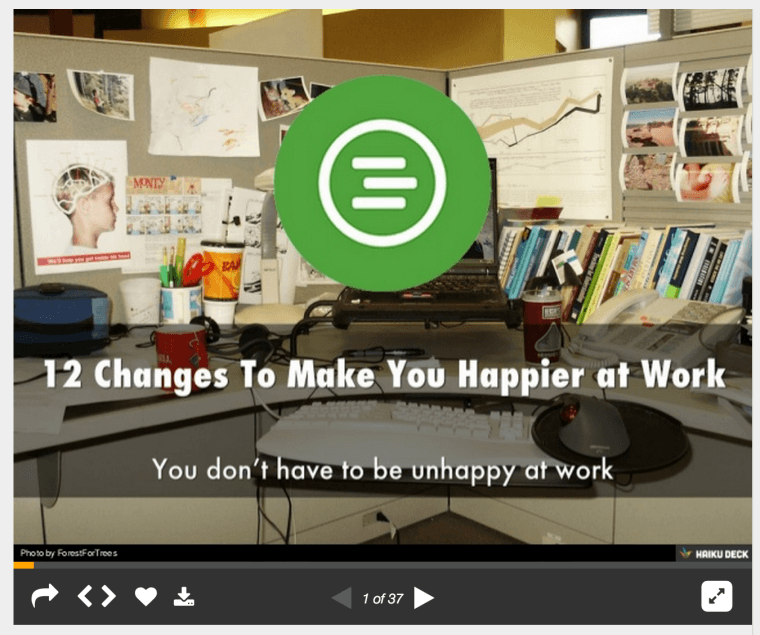
Simply writing and publishing blog posts isn’t enough. There’s so much digital noise out there today that this isn’t an “if you build it, they will come” kind of thing. Your work has only begun once you hit the “Publish” button – now, it’s time to promote your work.
For most bloggers, the natural first step is to share their content on Facebook and Twitter – but after this, many writers are at a loss. If all you’re doing is showcasing your blog posts on these sites, you’re missing out on the thousands of potential views that could come from sharing on other platforms.
Here are 15 additional places you should besharing your blog posts:
Turn your blog post into a slideshow presentation using PowerPoint or other software, and share the resulting document on SlideShare. Quality content presented in this format stands out, and there’s less competitionon SlideShare than on other sites.
Here’s an example of a blog post that When I Work (my company) turned into a Slidesharepresentation:

Not only is Visual.ly dedicated to helping companies create infographics and other types of visual content, it also provides a community for sharing these files. By turning your blog content into infographics or other visual content pieces and sharing them on this site, you’ll dramatically increase your blog’s exposure.
Sharing your content in LinkedIn Groups offers you targeted exposure beyond your usual list of connections. Just be sure the group welcomes shared content, and make sure the post is relevant to the group topic. Being perceived as a spammer on these sites won’t do any favors for your brand.
Pinterest’s active community makes this a great place to build traffic. By posting an attractive, relevant picture with a link to your post, your shareable image can help bring readers to you.
Instagram is another visual sharing site similar to Pinterest – use the same strategy you’d use to get your content noticed there and on Twitter on this site. Instagram has a strong reach into the teen and young adult demographics, making it a very attractive content sharing option for brands.
If you need traffic fast, look no further than Triberr. This platform is a social network where joining targeted “tribes” can help you build relationships with other bloggers and earn traffic by sharing others’ content.
StumbleUpon is a social network that allows users to browse random web pages by clicking the “Stumble” button. Add your content to the network, and if users like it (as noted by their ratings of your post), it’ll become more likely to appear in the random search rotation. It’s an easy way to drive credibility and increase readership.
Google+ is another social networking tool that can be used to expand the reach of your blog. By posting into targeted Google+ communities, you’ll get your content pieces in front of interested readers in order to boost traffic. Again, though, be careful of coming off as too self-promotional. Post unique content to Google+ and be sure that any shares you post offer legitimate value to your followers.
If you blog about small business in some way, consider sharing your post to BizSugar. This site is designed to help bloggers share small business news and tips, making it a great place to find new readers if this is your target audience.
Your Email List
By using a lead magnet – a valuable free giveaway that’s provided in exchange for your followers’ email addresses – it’s easy to build a list of subscribers who are interested in your content and your industry. When you have new blog content, share it with your list via email. If you post frequently, consider sending weekly or biweekly updates to avoid overwhelming your subscribers with messages.
Scoop.it is one of the places web users head to when they’re looking for new, interesting content, making it a great place to publish your blog posts. You can start using the program for free, but these “freemium” accounts are limited to one topic. For $11/month, you can upgrade to five topics, while business accounts with 15 topics are $67/month.
Niche-Based Social Bookmarking Sites
Depending on your particular focus, you can post to a variety of social bookmarking sites.Inbound.org, for example, is great for SEO, SMO, blogging, and internet marketing.ManageWP.org is a good place to post WordPress-related articles, while DesignFloat is perfect for web designers, and DZone is a good fit for developers.
Blog Engage is a site that lets you publish blog posts on a wide variety of topics for others to read. Everything from finance to anime to cosmetics is covered, so no matter what your focus is, you can find an audience of potential new readers on this blog sharing website.
Industry-Specific Social Networks
Apart from niche-based social bookmarking sites, some industries have their own specific social networks where they share information, help each other, and offer advice. Active Rain from Trulia, for example, is a network created exclusively for Realtors. If your industry has a similar network, be sure you’re sharing your work there.
Finally, if you have a specific niche, there’s likely a Reddit sub-forum for it. That said, Redditors (the site’s users) can be very intense, so make sure the content you share is very targeted, very high-quality and completely free of “marketing-speak”. The site has a HUGE amount of traffic, so if you can gain credibility, this can be a great source of readership for your blog.
Finding places to share your blog posts isn’t difficult – the internet is an enormous place with a tremendous number of opportunities. Just be sure that your content is relevant to the specific community you target and meets stringent quality guidelines before sharing. When you do so, you’ll discover that there are thousands of potential readers available out there for you that you’d never meet by sticking to Facebook and Twitter alone.
Are there any other online resources you use to share your content? Leave a comment below with your recommendations!

Post a Comment